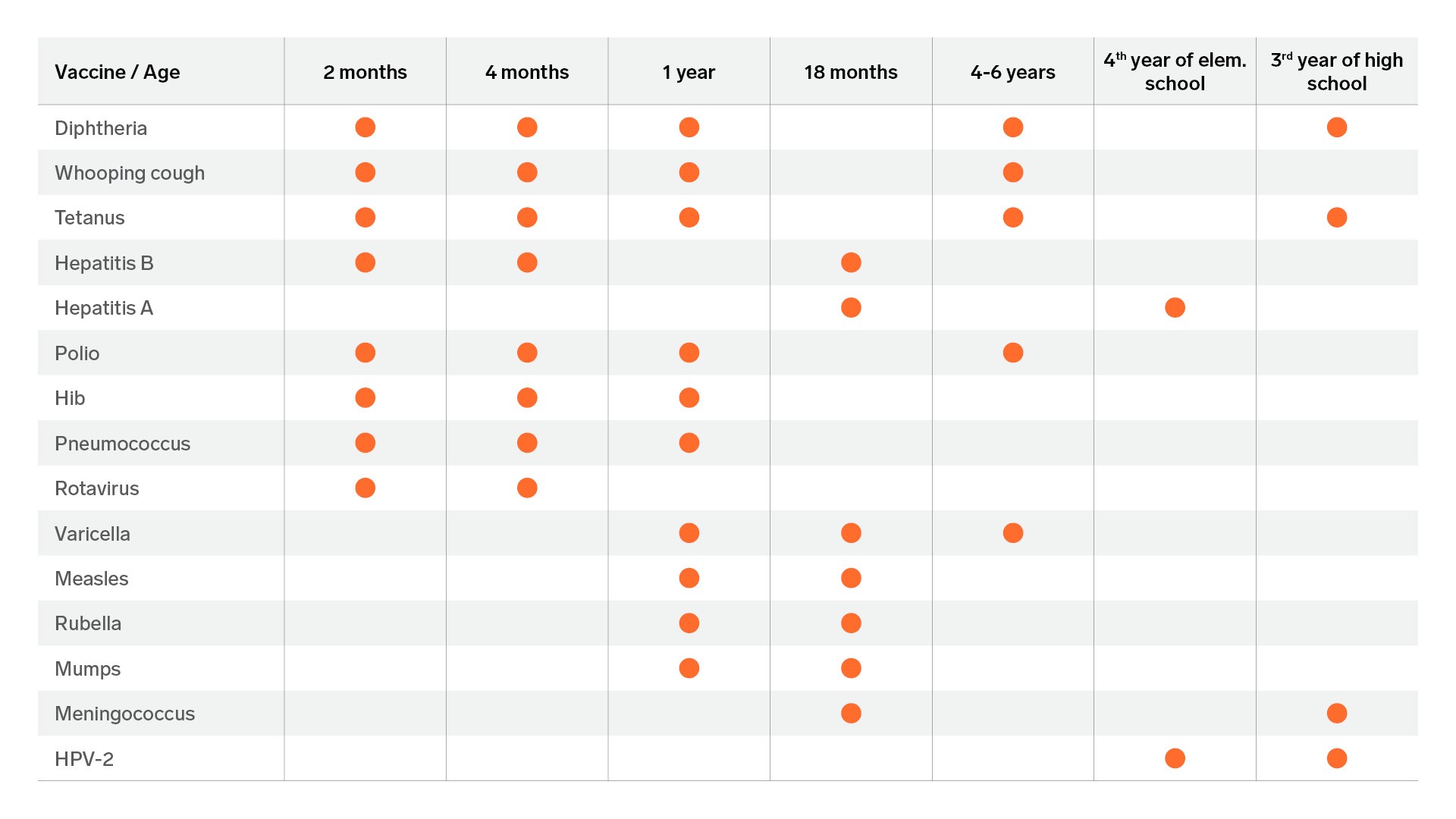Vaccination: An effective way to protect children’s health
April 2, 2024


An outbreak of measles in Quebec in late winter 2024 [1] reminded us that, although rare, highly infectious diseases such as measles continue to be present in some parts of the world and can easily reappear in Quebec. This is due to contamination brought by travellers from more infectious areas, combined with a sub-optimal child vaccination rate.
Before vaccination, one child in two in Quebec did not even reach the age of 18! Since the 20th century, thanks to vaccines, many diseases have become rarer or have disappeared altogether. Despite this, thousands of children in Quebec still contract diseases every year which they could have avoided if they had been vaccinated. This is why it is so important to take advantage of the Québec Immunization Program, which offers certain vaccines free of charge. Here is some information and advice to ease parents’ hesitations and children’s fears.
Is vaccination a victim of its own success?
Smallpox is a typical example of an infection that was completely eradicated in the late 1970s thanks to a worldwide vaccination campaign led by the WHO. The vaccine put an end to a disastrous pandemic that caused the death of over 300 million people worldwide in the 20th century [2].
Other infectious diseases have also fallen sharply: polio, diphtheria, tetanus, rabies, various types of meningitis, and measles [3]. The rarity of these diseases has led people to believe that vaccination is no longer required.
Yet, it is estimated that more than 10,000 children aged 0 to 16 contract a vaccine preventable disease (VPD) every year in Quebec. This figure is based on the Canadian incidence rate of nine vaccine preventable diseases in 2019 [4] and the number of children per age group in Quebec in the same year [5]. The number would be even higher if federal statistics had also taken into account mumps, hepatitis A and B, and rotavirus gastroenteritis.
Children who contract a VPD do not always suffer serious complications, but such effects can occur in unvaccinated individuals. While vaccination is not always 100% effective, especially in children with weakened immune systems, symptoms are much less severe in children who are properly vaccinated.
Complications of VPDs
| Vaccine preventable disease | Complications |
|---|---|
| Whooping cough | Otitis, pneumonia, convulsions, fractures, death |
| Diphtheria | Respiratory difficulties, heart or nervous system damage, death |
| Hæmophilus influenzæ type B (Hib) | Meningitis, severe neurological sequelae, deafness, death |
| Invasive meningococcal disease | Deafness, neurological damage, amputation, scars, death |
| Invasive pneumococcal disease | Otitis, sinusitis, chronic bronchitis, pneumonia, meningitis, death |
| Mumps | Meningitis, pancreatitis, encephalitis, deafness |
| Polio | Respiratory problems, muscle stiffness, paralysis, death |
| Measles | Otitis, bronchitis, pneumonia, persistent diarrhea |
| Rubella | Encephalitis, coagulation problems |
| Congenital rubella | Severe fetal malformations |
| Tetanus | Vertebral fractures, cardiomyopathy, pneumonia, death |
| Varicella (chickenpox) | Otitis, pneumonia, skin infection, encephalitis |
When and where should your child be vaccinated?
Children need to be vaccinated at different times of their lives, from as early as two months of age, for the best possible protection against VPDs. Some vaccines require only a single dose, while others require several doses to ensure long-term protection. As part of its immunization program, the Quebec government has drawn up a schedule of vaccines to be administered to children aged 0 to 16 years [6].
Vaccination schedule (Click here to enlarge the tab)

The procedure for vaccinating preschool-aged children varies from region to region. For more details, contact your CLSC, doctor or pharmacist, or call Info-Santé at 811.
Vaccines scheduled for the fourth year of elementary school and third year of high school, as well as those covered by a special immunization campaign, are administered in schools. Information is provided by the school.
To allay concerns
Parents’ hesitations
An estimated 24% of Quebec parents are reluctant to vaccinate their children or delay certain vaccines, most often because they fear side effects [7]. Unfortunately, many unsubstantiated beliefs are promoted on websites that lack credibility.
For example, according to these sites, some vaccines could cause illnesses or health problems, such as allergies, brain damage, multiple sclerosis, chronic fatigue syndrome, cancer and even autism. Studies have scientifically demonstrated that this is not the case. In fact, research shows that the risks associated with vaccines are infinitely rarer than the complications that can occur in unvaccinated children [8].
Some parents also question the need for vaccination because they rely on herd immunity to protect their child, or because they believe that natural infections or homeopathic measures provide greater protection than a vaccine. Once again, these assertions have been refuted by recognized health authorities. To find out more, consult the Quebec government’s frequently asked questions about vaccination (in French only)[9].
Children’s fears
Around 90% of children aged 15 to 18 months and 50% of children aged 4 to 6 years show symptoms of anxiety at the time of vaccination [10]. This is another reason why some parents will delay or avoid a booster vaccination.
What is important to know is that the people who administer vaccines have a whole range of techniques and recommendations adapted to each age group to reduce anxiety and pain during vaccination.
In addition, the government and health care centres offer parents strategies [11,12] to prepare their children for vaccination, no matter their age. For example, a topical anesthetic can be applied an hour before the injection to induce temporary numbness of the skin and avoid pain.
A baby can be given a sugar solution a few minutes before the injection, as it is known to reduce pain in young children. You can also try to distract them by playing with a toy during the vaccination.
For older children, the preferred strategy is to explain the reasons and procedure for the vaccination, avoiding any references to pain. Objects that can distract them or make them more comfortable at the clinic should also be kept in mind, such as a stuffed animal, blanket or toy.
Protection you can no longer live without
Quebec’s immunization program has proven its worth. Thanks to vaccines, diphtheria, polio, rubella and measles are considered eliminated in Quebec and other VPDs remain under control [13]. But it is important to maintain good vaccination coverage to protect the entire population.
To avoid the spread of infection, it’s estimated that at least 95% of a population must be vaccinated. That’s why it’s crucial to sign up for an established, free program such as the Québec Immunization program. It’s also important to take advantage of targeted vaccination campaigns, such as the emergency launch of the measles campaign in several schools in spring 2024 [14].
Therefore, parents are encouraged to follow the vaccination schedule for children proposed by Quebec’s health ministry. Vaccines are still necessary, even if the risk of infection is decreasing. Contagious diseases circulate everywhere around the world and those that we think have been eliminated could, unfortunately, one day reappear in Quebec.
This revised edition reflects an updated version from the original version published on our website. We have incorporated recent facts to offer you current and pertinent information.
For professional support, we are here to help.
Biron provides access to the most common vaccines.
For more information on our services or to make an appointment, contact Biron Groupe Santé customer service at 1 833 251-6006.
Sources14
- Ministère de la santé et des services sociaux. Measles outbreak. March 2024, https://www.quebec.ca/en/health/health-issues/a-z/measles/measles-outbreak. Consulted April 2, 2024.
- World Health Organization. Commemorating Smallpox Eradication – a legacy of hope, for COVID-19 and other diseases, May 8, 2020. https://www.who.int/news/item/08-05-2020-commemorating-smallpox-eradication-a-legacy-of-hope-for-covid-19-and-other-diseases. Consulted August 29, 2023.
- Fédération des médecins spécialistes du Québec. Vaccination : Halte à la désinformation. https://fmsq.org/fr/dossiers-sante/vaccination-halte-la-desinformation#:~:text=La%20vaccination%20%3A%20victime%20de%20son%20succ%C3%A8s&text=Ce%20qui%20peut%20faire%20croire,une%20campagne%20mondiale%20de%20vaccination. Consulted August 29, 2023.
- Public Health Agency of Canada. Vaccine Preventable Disease: Surveillance Report to December 31, 2019, May 2022. https://www.canada.ca/en/public-health/services/publications/healthy-living/vaccine-preventable-disease-surveillance-report-2019.html. Consulted August 29, 2023.
- Institut de la statistique du Québec. Population of Québec by age and sex, 1971-2022. https://statistique.quebec.ca/en/document/population-and-age-and-sex-structure-quebec/tableau/population-of-quebec-by-age-and-sex#tripop=10. Consulted August 29, 2023.
- Ministère de la Santé et des Services sociaux. Québec Immunization Program –Immunization schedules by age group. https://www.quebec.ca/en/health/advice-and-prevention/vaccination/quebec-immunisation-program. Consulted August 29, 2023.
- Public Health Agency of Canada. Vaccine hesitancy in Canadian parents, March 2022. https://www.canada.ca/en/public-health/services/publications/healthy-living/vaccine-hesitancy-canadian-parents.html. Consulted August 29, 2023.
- Government of Quebec. Demystifying beliefs regarding the risks of vaccination. https://www.quebec.ca/en/health/advice-and-prevention/vaccination/demystifying-beliefs-regarding-vaccination. Consulted August 29, 2023.
- Ministère de la Santé et des Services sociaux. Questions et réponses sur la vaccination. https://www.msss.gouv.qc.ca/professionnels/vaccination/piq-communication/questions-et-reponses-sur-la-vaccination. Consulted August 29, 2023.
- Ministère de la Santé et des Services sociaux. Administration des produits immunisants : Techniques d’atténuation de la douleur et de l’anxiété. https://www.msss.gouv.qc.ca/professionnels/vaccination/piq-administration-des-produits-immunisants/techniques-d-attenuation-de-la-douleur-et-de-l-anxiete/. Consulted August 29, 2023.
- Ministère de la Santé et des Services sociaux. “Diminuer la douleur et l’anxiété liées à la vaccination chez les enfants”. March 2022. https://publications.msss.gouv.qc.ca/msss/fichiers/fichesvaccins/20-278-27F.pdf. Consulted August 30, 2023.
- CHU Sainte-Justine. “Pour une vaccination des enfants tout en douceur.” https://www.chusj.org/CORPO/files/21/21e6b67d-ee18-4a25-97ef-efbda8fe3a68.pdf. Consulted August 30, 2023.
- Brousseau, Nicolas and Amini, Rachid. Maladies évitables par la vaccination à déclaration obligatoire : rapport de surveillance 2019-2021, Institut national de santé publique du Québec, April 28, 2023. https://www.inspq.qc.ca/publications/3324. Consulted August 31, 2023.
- Radio-Canada. Rougeole: Québec lance une campagne de vaccination dans les écoles. [https://ici.radio-canada.ca/nouvelle/2055628/rougeole-sante-publique-campagne-vaccination-ecole]. Consulted april 2, 2024.
